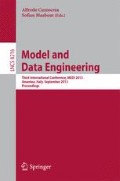Abstract
OntoUML is a promising method for ontological modelling. In this paper, we discuss its possible use for software engineering. We propose a method of transformation of an ontological model into a software-engineering object-oriented class model in UML and its instantiation. Our approach is based on the following best practices: pure object-oriented paradigm and approach of dividing state and identity as introduced in the Clojure programming language.
Access this chapter
Tax calculation will be finalised at checkout
Purchases are for personal use only
Preview
Unable to display preview. Download preview PDF.
References
Pícka, M., Pergl, R.: Gradual modeling of information system: Model of method expressed as transitions between concepts. In: Proceedings of the ICEIS 2006 - 8th International Conference on Enterprise Information Systems, vol. ISAS, pp. 538–541 (2006)
Guizzardi, G.: Ontological Foundations for Structural Conceptual Models, vol. 015. University of Twente, Enschede (2005)
Guizzardi, G.: The problem of transitivity of part-whole relations in conceptual modeling revisited, Amsterdam, The Netherlands (2009)
Guizzardi, G.: Agent roles, qua individuals and the counting problem. In: Garcia, A., Choren, R., Lucena, C., Giorgini, P., Holvoet, T., Romanovsky, A. (eds.) SELMAS 2005. LNCS, vol. 3914, pp. 143–160. Springer, Heidelberg (2006)
Goncalves, B., Guizzardi, G., Pereira Filho, J.G.: Using an ECG reference ontology for semantic interoperability of ECG data. Special Issue on Ontologies for Clinical and Translational Research (2011)
Barcelos, P.P.F., Guizzardi, G., Garcia, A.S., Monteiro, M.: Ontological evaluation of the ITU-T recommendation g.805, vol. 18. IEEE Press, Cyprus (2011)
Booch, G., Maksimchuk, R.A., Engel, M.W., Young, B.J., Conallen, J., Houston, K.A.: Object-Oriented Analysis and Design with Applications, 3 edn. Addison-Wesley Professional (April 2007)
Hunt, J.: Smalltalk and Object Orientation: An Introduction, 1st edn. Springer (July 1997)
Guizzardi, G.: Representing collectives and their members in UML conceptual models: An ontological analysis. In: Trujillo, J., et al. (eds.) ER 2010. LNCS, vol. 6413, pp. 265–274. Springer, Heidelberg (2010); WOS:000289184200033
Fowler, M.: UML Distilled: A Brief Guide to the Standard Object Modeling Language, 3rd edn. Addison-Wesley Professional (September 2003)
VanderHart, L., Sierra, S.: Practical Clojure, 1st edn. Apress (June 2010)
Kay, A.C.: The early history of smalltalk. SIGPLAN Not. 28(3), 69–95 (1993)
Gessenharter, D.: Mapping the UML2 semantics of associations to a java code generation model. In: Czarnecki, K., Ober, I., Bruel, J.-M., Uhl, A., Völter, M. (eds.) MODELS 2008. LNCS, vol. 5301, pp. 813–827. Springer, Heidelberg (2008)
Gessenharter, D.: Implementing UML associations in java: a slim code pattern for a complex modeling concept. In: Proceedings of the Workshop on Relationships and Associations in Object-Oriented Languages, RAOOL 2009, pp. 17–24. ACM, New York (2009)
Rybola, Z., Richta, K.: Transformation of special multiplicity constraints - comparison of possible realizations. In: FedCSIS 2012, Wroclaw, Poland (September 2012)
Carraretto, R.: Separating Ontological and Informational Concerns: A Model-driven Approach for Conceptual Modeling. Master thesis, Federal University of Espírito Santo (2012)
Gottlob, G., Schrefl, M., Röck, B.: Extending object-oriented systems with roles. ACM Trans. Inf. Syst. 14(3), 268–296 (1996)
Cabot, J., Raventós, R.: Conceptual modelling patterns for roles. In: Spaccapietra, S., Atzeni, P., Chu, W.W., Catarci, T., Sycara, K. (eds.) Journal on Data Semantics V. LNCS, vol. 3870, pp. 158–184. Springer, Heidelberg (2006)
Bierman, G., Wren, A.: First-class relationships in an object-oriented language. In: Gao, X.-X. (ed.) ECOOP 2005. LNCS, vol. 3586, pp. 262–286. Springer, Heidelberg (2005)
Mark Volkmann, R.: Clojure - functional programming for the JVM
Halloway, S.: Programming Clojure, 1st edn. Pragmatic Bookshelf (2009)
Author information
Authors and Affiliations
Editor information
Editors and Affiliations
Rights and permissions
Copyright information
© 2013 Springer-Verlag Berlin Heidelberg
About this paper
Cite this paper
Pergl, R., Sales, T.P., Rybola, Z. (2013). Towards OntoUML for Software Engineering: From Domain Ontology to Implementation Model. In: Cuzzocrea, A., Maabout, S. (eds) Model and Data Engineering. MEDI 2013. Lecture Notes in Computer Science, vol 8216. Springer, Berlin, Heidelberg. https://doi.org/10.1007/978-3-642-41366-7_21
Download citation
DOI: https://doi.org/10.1007/978-3-642-41366-7_21
Publisher Name: Springer, Berlin, Heidelberg
Print ISBN: 978-3-642-41365-0
Online ISBN: 978-3-642-41366-7
eBook Packages: Computer ScienceComputer Science (R0)

